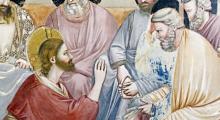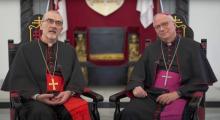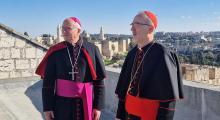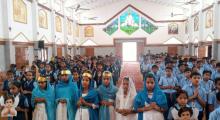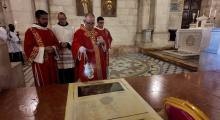Issued by the Catholic Center for Studies and Media - Jordan. Editor-in-chief Fr. Rif'at Bader - موقع أبونا abouna.org
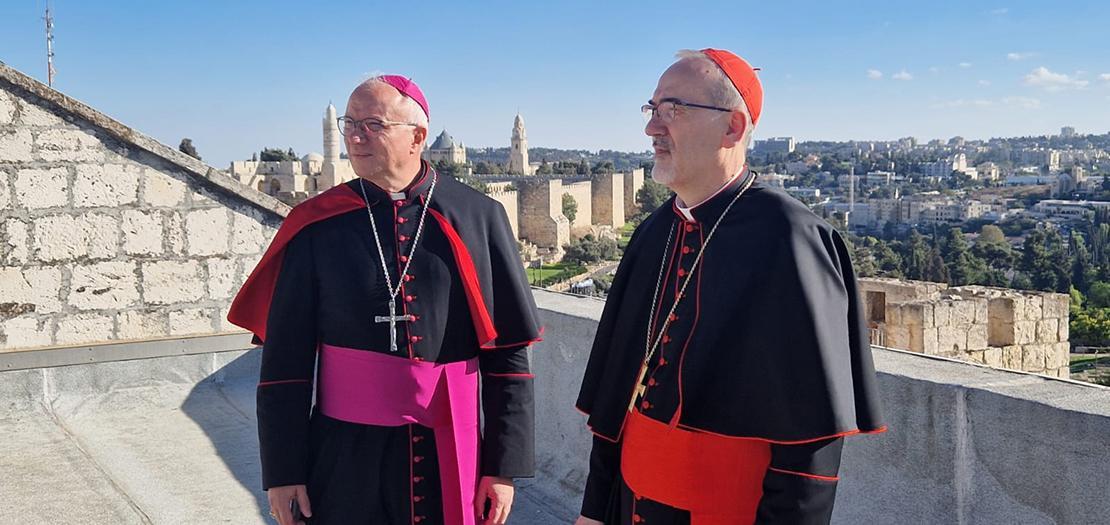
From 27 to 30 September, Archbishop Giuseppe Baturi visited the Holy Land to express the CEI’s solidarity with the Christian community. Together with Patriarch Pizzaballa, he reaffirmed the Italian Church’s support through humanitarian aid, youth programs, and a project to establish a hospital in Gaza. A future pilgrimage by the Italian bishops was also announced
“In this difficult time of solitude and abandonment, closeness and presence are of great importance: for this, we wish to express our sincere gratitude.” With these words, Cardinal Pierbattista Pizzaballa, Latin Patriarch of Jerusalem, welcomed and acknowledged the visit to the Holy Land of Archbishop Giuseppe Baturi, Secretary General of the Italian Bishops’ Conference (CEI). The fraternal journey – from 27 to 30 September – aimed to express the solidarity of the Italian Church with the local Christian community, strengthen humanitarian aid, and assess the possibility of organizing a future pilgrimage by the Italian Episcopate.
During the days spent in Jerusalem, Galilee, and Judea, the secretary general of the CEI met with parish communities, priests, and religious men and women, gathering testimonies of suffering, but also witnessing signs of resilience and a desire for hope.
“We have felt this over the past months from many Italian Churches: a genuine closeness,” the Patriarch emphasized, referring to the concrete support, prayers, and ongoing attention received. He specifically recalled a retreat held with some local priests, during which the need for human, spiritual, and ecclesial proximity emerged strongly: “They told us they feel the need for, and are grateful for, this empathy and closeness, beyond the scope of projects.”
Humanitarian Aid and a Hospital Project in Gaza
From the heart of Jerusalem, Archbishop Baturi reaffirmed the concrete commitment of the Italian Church alongside the Christian communities of the Holy Land. “We want to share, in faith, the hope of a better world,” he stated, “but also the indignation at an unjust violence that tramples on human dignity.” His words echoed the recent appeal of the CEI’s Permanent Council, which met in Gorizia, and reiterated the urgent need for a firm stance against all forms of brutality: “Violence must stop, hostages must be released, and attacks against a people who cannot be punished in this way must end.” Yet, he insisted, faith and denunciation must be followed by action.
“We are working on opening a hospital within Gaza,” he announced. “There is a very serious healthcare crisis, and we want to take responsibility for it together with the Latin Patriarchate.”
An ambitious but necessary project, which, he explained, will require “energy, synergy, and shared responsibility”. Alongside this, other urgent priorities include: Food aid for families, support for parish priests, programs for young people, housing, and education. “This is the energy of peace,” said Baturi, “because it forms consciences and opens up the future. This is the response we wish to offer as the Italian Church—not from afar, but as brothers in faith.”
Pilgrimages, Faith, and Fraternity
In addition to the various initiatives, the visit also sought to revive another dimension of ecclesial fraternity: that of pilgrimage. A journey not only physical but spiritual, one that rebuilds bonds and strengthens communion. “We want to promote visits to the holy places as a bond with the communities,” explained Archbishop Baturi, “not merely as a tourist itinerary. We will organize a pilgrimage as Italian bishops and promote others, responding to the appeals received from many parish priests in Judea and Galilee.”
The proposal is to relaunch the pilgrimage as a “gesture of tangible closeness”, an opportunity to walk alongside the local Church, to listen to it, accompany it, and strengthen its witness.
Concluding the meeting, Cardinal Pizzaballa offered a reflection that encapsulates the deeper meaning of the visit: “Hope needs gestures, words, but above all a context where a network is built, where unity and community are forged. In the great contexts of pain and suffering, there is a need to have someone nearby who supports and helps you. In this sense, all of this becomes a sign of hope.”
It is a hope born of encounter, of sharing, of fraternity. It is the hope that the Italian Church sought to renew in the Holy Land, bringing a living sign of communion and responsibility.


